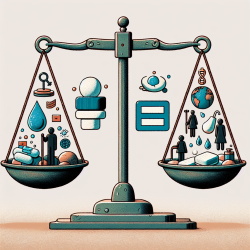Introduction
Water, sanitation, and hygiene (WASH) services are fundamental to human well-being, influencing health, education, and social equality outcomes. However, the benefits of WASH interventions are not evenly distributed, particularly in low- and middle-income countries (LMICs). The recent systematic review titled "PROTOCOL: What is the impact of complex WASH interventions on gender and social equality outcomes in low- and middle-income countries?" highlights the importance of addressing these disparities.
Understanding the Impact of WASH Interventions
The review conducted by Macura et al. (2021) provides a comprehensive analysis of how complex WASH interventions affect gender and social equality outcomes. It emphasizes that while WASH services can significantly improve health and educational outcomes, they also have the potential to address gender and social inequalities. For instance, interventions that provide safe and private sanitation facilities can reduce the burden on women and girls, who often bear the responsibility for water collection and sanitation management.
Key Findings
The systematic review identifies several critical findings that practitioners can leverage to enhance their interventions:
- Gender-Sensitive Design: WASH interventions should be designed with gender considerations in mind, ensuring that facilities are safe and accessible for women and girls. This includes addressing specific needs such as menstrual hygiene management.
- Inclusive Participation: Encouraging the participation of women and marginalized groups in decision-making processes can lead to more equitable outcomes. This involvement can also foster empowerment and self-confidence among these groups.
- Integrated Approaches: Combining WASH interventions with other development sectors, such as education and health, can amplify their impact on gender and social equality.
Challenges and Opportunities
Despite the potential benefits, the review also highlights challenges in implementing WASH interventions that effectively address gender and social equality. Measuring social change is complex and context-specific, often requiring cross-sectoral collaboration and long-term commitment. Practitioners are encouraged to develop robust evaluation frameworks that capture both technical and social outcomes.
Recommendations for Practitioners
Practitioners looking to improve their WASH interventions should consider the following recommendations:
- Incorporate gender and social equality considerations into the design and implementation of WASH interventions.
- Engage with local communities to understand their specific needs and challenges, ensuring that interventions are culturally relevant and acceptable.
- Develop partnerships with other sectors to create integrated solutions that address multiple aspects of inequality.
- Invest in rigorous monitoring and evaluation to understand the long-term impacts of interventions on gender and social equality.
Conclusion
WASH interventions hold significant potential to improve gender and social equality outcomes in LMICs. By implementing the findings from the systematic review, practitioners can enhance the effectiveness of their interventions and contribute to more equitable societies. For those interested in delving deeper into the research, the original paper can be accessed here.










